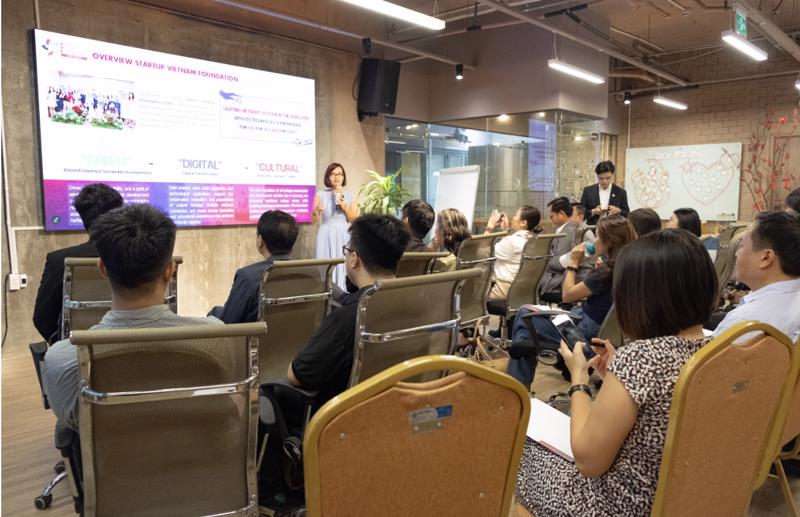At the “Smart Agriculture Focus Group” event held on May 15 by the Australian Trade and Investment Commission (Austrade) in collaboration with the Startup Vietnam Foundation (SVF), experts gathered to discuss and identify barriers, opportunities, and emerging challenges in the development of smart agriculture in Vietnam.
GREAT OPPORTUNITIES FOR SMART AGRICULTURE IN VIETNAM
At the event, Mr. Le Minh Nhut, Co-founder and CEO of Demeter, emphasized the crucial role of agriculture in Vietnam’s economy, accounting for 12–14 per cent of GDP. Vietnam has set an ambitious goal to become one of the world’s leading agricultural nations by 2050 and to be among the top 10 global agricultural processing hubs by 2030.
According to Mr. Nhut, the Vietnamese Government is strongly promoting the model of an “agricultural economy”. In which, the modernization of production processes and the enhancement of added value in agriculture are being actively pursued, thereby creating many potentials for developing smart agriculture.
Mr. Nhut shared that there are currently over 300 AgriTech enterprises in Vietnam operating in various fields such as climate change adaptation, environmental monitoring, automation, and traceability , all of which are critical to improving production efficiency and agricultural product quality.
In addition, green capital is increasingly flowing into the sustainable agriculture sector, especially investments in agricultural technology (AgriTech). A notable example is Techcoop - a Vietnamese agricultural technology startup, has recently successfully raised $70 million - a positive signal reflecting the growing momentum of innovation investment in Vietnam’s smart agricultural sector.
Vietnam also enjoys many advantages, such as its strategic location in Southeast Asia, the potential to become a global agricultural processing hub, and the capacity to develop high value-added agricultural products for export. Therefore, accelerating the development of smart agriculture is essential to boost productivity in this sector.
Experts at the event also noted that Vietnam is emerging as an attractive destination for agricultural technology investors thanks to its impressive growth rate. With the advancement of new technologies such as the Internet of Things (IoT), Artificial Intelligence (AI), and Big Data analytics, Vietnam holds great potential for transforming its agricultural production model towards smart farming, thereby increasing productivity and product quality.
OVERCOMING CHALLENGES TOWARD A PROMISING FUTURE
However, alongside potential and opportunities, experts also pointed out several major challenges that Vietnam must address in developing smart agriculture.
One of the biggest barriers is the fragmented and small-scale landholding of most farming households, which hinders the synchronized implementation of technological solutions and increases the complexity of managing and operating smart production systems.
There is also a severe shortage of high-quality human resources for the agricultural sector. The proportion of workers with formal education and technical skills remains low. Meanwhile, many farmers have limited awareness of quality standards and limited access to technology. Recruiting technical experts or personnel specialized in digital agriculture remains a significant challenge.
Financial constraints are another major barrier. Small-scale farmers and businesses often find it difficult to access loans due to a lack of credit history or collateral. AgriTech and aquaculture startups also face significant difficulties in raising capital to scale their operations.
Moreover, the lack of policy consistency and a legal framework for the development of smart agriculture continues to impede the large-scale application of technology.
The high initial investment cost of smart agricultural models remains a hurdle for small-scale farmers, who may struggle to access or see immediate results. Meanwhile, many micro and small enterprises (MSMEs) still lack a proper digital transformation strategy.
In response to these challenges, Mr. Nguyen Hong Hiep, Director of Corporate Affair of PAN Group, suggested that Vietnam should intensify the use of digital tools to effectively manage the entire agricultural production chain.
“Although farmers may find it difficult to use management software, it is entirely feasible to deploy technical support teams on-site. This will help effectively monitor the use of crop varieties and pesticides, thereby improving pest control and reducing the need for frequent field inspections,” Mr. Hiep suggested.
Additionally, Ms. Le Hong Minh, CEO of i.Value Corporation and Executive Committee Member of SVF, emphasized that for the smart agriculture model in Vietnam to develop sustainably, there must be close cooperation among all stakeholders, from the Government and large enterprises to social organizations.
“Each party must clearly define its role and specific responsibilities in promoting the innovation ecosystem in agriculture in the near future,” she stressed.









 Google translate
Google translate